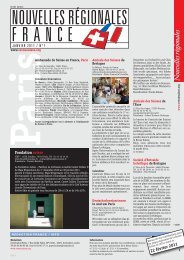Which energy will be best for Switzerland? Doris ... - Schweizer Revue
Which energy will be best for Switzerland? Doris ... - Schweizer Revue
Which energy will be best for Switzerland? Doris ... - Schweizer Revue
You also want an ePaper? Increase the reach of your titles
YUMPU automatically turns print PDFs into web optimized ePapers that Google loves.
10<br />
THE FUTURE OF ENERGY SUPPLY<br />
The Federal Office<br />
03 <strong>for</strong> Energy plans to<br />
use natural gas power plants to<br />
bridge the shortfall in electricity<br />
from the year 2020. What<br />
are the advantages and disadvantages<br />
of gas-fired power<br />
plants?<br />
Rechsteiner: Demand should never outstrip supply. As prices increase, efficient and renewable technologies<br />
<strong>will</strong> (finally!) come to the <strong>for</strong>e. Those that aren’t efficient <strong>will</strong> <strong>be</strong> swept off the market.<br />
Steinmann: If electricity consumption continues to grow by 1 to 2 percent a year, we <strong>will</strong> already start having<br />
deficits from 2015 during the winter months. At the same time as massively increasing our <strong>energy</strong> efficiency,<br />
we must try to plug the remaining gap on the production side. In so doing, the proportion of renewable<br />
energies should <strong>be</strong> expanded as far as possible. However, the remaining requirements must <strong>be</strong> met by<br />
conventional production technologies. Basically, we really have only two alternatives: new nuclear power stations<br />
or gas-fired plants. No new nuclear power stations are on the cards in the short to medium term, since<br />
the waste disposal issue first needs to <strong>be</strong> solved once and <strong>for</strong> all. Among the economically acceptable alternatives,<br />
we assume that combined gas-fired power plants are the lesser evil. Their relative advantages are that<br />
they can <strong>be</strong> planned, approved and built quickly, and they are acceptable from an <strong>energy</strong> point of view if coupled<br />
with credible CO2 compensation measures. What’s more, if we use combined gas-fired power stations,<br />
we are not tying ourselves to a technology <strong>for</strong> 60 years, as would <strong>be</strong> the case with new nuclear power plants.<br />
Spreng: One advantage is that gas-fired power plants do not tie up much capital and could there<strong>for</strong>e <strong>be</strong> suitable<br />
as a bridging solution. The disadvantage is that <strong>Switzerland</strong> would relinquish its trump card of CO2-free<br />
electricity production if it built new gas-fired power stations.<br />
Is there still a sufficient<br />
potential <strong>for</strong> 04<br />
expanding and modernising<br />
hydroelectric power plants in<br />
our country? Can the capacities<br />
of hydroelectric plants <strong>be</strong><br />
increased further?<br />
Rechsteiner: Gas-fired power plants can handle peak loads. They are relatively cheap and quick to build.<br />
Combined with heat pumps and good waste heat reutilisation, they can even cut CO2 emissions if part of the<br />
electricity is used to replace oil-powered heating systems (via heat pumps). The disadvantages are the CO2<br />
emissions and the lack of cost security, <strong>be</strong>cause gas prices follow the price of oil.<br />
Steinmann: Hydroelectric power remains the most important domestic pillar of our <strong>energy</strong> supplies. However,<br />
there is relatively little scope <strong>for</strong> economically viable expansion of hydroelectric power in <strong>Switzerland</strong>,<br />
and what there is, is based mainly on measures to optimise and expand existing plants. Hydroelectric power<br />
could there<strong>for</strong>e grow by 5 to 10 percent.<br />
Spreng: Hydroelectric power plants play a key role in securing the country’s <strong>energy</strong> supplies. If the electricity<br />
market were opened up to competition, the state would have to ensure that the modernisation of hydroelectric<br />
power plants was not neglected. Looked at purely in terms of financial investment, many of these expansion<br />
and upgrading projects are not particularly cost-efficient. Luckily, nearly all hydroelectric power<br />
stations are still in public hands. So let’s hope that the powers that <strong>be</strong> won’t only <strong>be</strong> looking at short-term cash<br />
flows.<br />
SWISS REVIEW August 2006 / No. 4<br />
Will <strong>Switzerland</strong><br />
05 need new nuclear<br />
power plants when the existing<br />
ones close? Do atomic technologies<br />
even have a future? And<br />
how do you assess the attitudes<br />
towards nuclear power among<br />
the general public?<br />
Rechsteiner: Much can still <strong>be</strong> gained by modernising existing hydroelectric plants. In particular, <strong>Switzerland</strong><br />
could earn even more money than it does now through an international reservoir management network.<br />
Wind <strong>energy</strong> and hydroelectric power complement each other ideally. When the wind blows, electricity prices<br />
fall and water reserves are preserved or topped up. When there’s no wind, you can use the hydroelectric plants.<br />
The important thing is that water conservation is not neglected. If cleverly and carefully designed, protection<br />
and utilisation needn’t <strong>be</strong> mutually exclusive.<br />
Steinmann: By 2020 at the latest, when the oldest nuclear power stations in <strong>Switzerland</strong> are taken out of operation,<br />
there <strong>will</strong> <strong>be</strong> a shortfall in our electricity supplies. This could theoretically <strong>be</strong> plugged in the medium<br />
to long term by a new nuclear power station, since this option still remains open in <strong>Switzerland</strong> following several<br />
referendums on the matter. In the meantime, however, construction of a new Swiss nuclear power plant<br />
is rather unrealistic. Instead of engaging in trench warfare over the issue <strong>for</strong> the next 20 years, we should work<br />
on improving <strong>energy</strong> efficiency and on renewable <strong>energy</strong> technologies. The Federal Office <strong>for</strong> Energy is presently<br />
drawing up its <strong>energy</strong> predictions <strong>for</strong> the year 2035. These results, which <strong>will</strong> <strong>be</strong> presented at the end of<br />
this year, can <strong>for</strong>m the basis of the political debate about how many and what types of conventional power<br />
plants we really need in 20 to 30 years, <strong>be</strong> they nuclear or combined gas-fired.<br />
Spreng: In spite of the danger of proliferation and the durability of radioactive waste, I get the impression<br />
that mankind <strong>will</strong> not <strong>be</strong> able to resist the temptation to use this compact <strong>energy</strong> source. I would <strong>be</strong> happy if<br />
<strong>Switzerland</strong> didn’t build any more reactors that were not inherently safe, i.e. that the chosen reactor types<br />
couldn’t possibly release unhealthy amounts of radioactivity in the event of an accident.
















